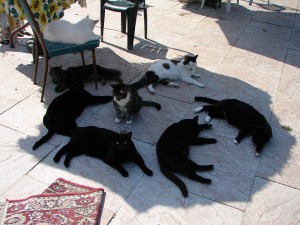so what, what if it is? ![]()
[Dutch phrase of the week]
[Wat dan nog?]
 “Wat dan nog?” is an alternative to “nou en?” You can use it when you are annoyed, or when you want to say that you think something will not have that much of an influence.
“Wat dan nog?” is an alternative to “nou en?” You can use it when you are annoyed, or when you want to say that you think something will not have that much of an influence.
Examples:
– “Hé, ik zat hier, dit is mijn plek!” – “Ja wat dan nog, ga daar maar zitten!”
(“Hey, I was sitting here, this is my spot!” – “Yeah, so what, go sit over there!”)
– “En wat dan nog? Jij hebt geen (enkel) recht van spreken, jij bent zelf blijven zitten!”
(“So what? You have no right to speak (at all), you were kept down a class/grade held back / you had to repeat the year yourself!” Note that ‘jij bent blijven zitten’ literally means ‘you remained sitting’. Which could also be a cause for arguing, you never know 🙂 )
– “En wat dan nog joh, zelfs als ze je een onvoldoende geven, ga je nog over!”
(“And what if it is, even if you fail the test/exam you will still move up to the next grade!” An ‘onvoldoende’ literally translates as an ‘insufficient one’.)
– “Ga je met die jas naar buiten? Het gaat straks enorm regenen!” – “Wat dan nog, ik ben toch niet van suiker!”
(“Are you going outside with that coat? It will rain heavily in a while!” – “So what, I’m not made of sugar am I?” Note that ‘zijn van’ can mean ‘to be made of’ and hence you can leave out the ‘gemaakt’ if you want.)
Expressions:
– “Nou en?!”: so what!
– “Wat kan mij het schelen?“: what do I care?
Example:
– “Wat kan mij het schelen, ik neem nog een biertje!”
(“What do I care, I’ll have another beer!”)
Related words:
– De schouders ophalen: to shrug [verb] [haalde de schouders op, de schouders opgehaald]. Literally: “to lift up the shoulders”.
– Wat: what [indefinite pronoun].
– Dan: then [adverb].
Example:
– “Ja en wat dan?”- “Nou, en dan niks!”
(“Yes and then what?” – “Well, and then nothing!”)

 “Normaal gesproken” literally translates to “normally spoken”. “Gesproken” is the past participle of the irregular verb “spreken” [sprak, h. gesproken].
“Normaal gesproken” literally translates to “normally spoken”. “Gesproken” is the past participle of the irregular verb “spreken” [sprak, h. gesproken]. The verb “harden” translates as “to harden”, “to toughen up” or “to bear/stand”. In case of the latter, one often uses the phrase “niet te harden” to say that something is unbearable. This can basically be anything, see the examples.
The verb “harden” translates as “to harden”, “to toughen up” or “to bear/stand”. In case of the latter, one often uses the phrase “niet te harden” to say that something is unbearable. This can basically be anything, see the examples.